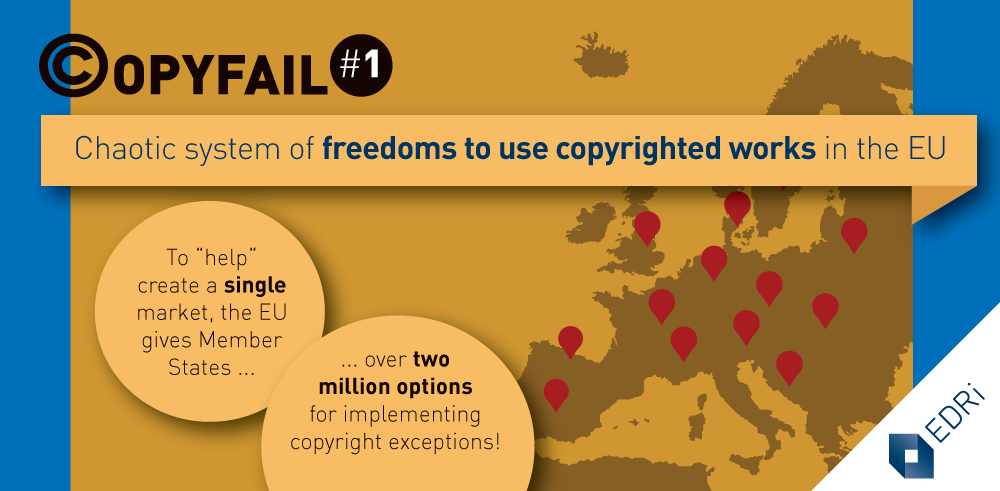Copyfail #1: Chaotic system of freedoms to use copyrighted works in the EU
This article is the first one in the series presenting Copyfails. The EU is reforming its copyright rules. We want to introduce to you the main failures of the current copyright system, with suggestions on how to fix them. You can find the nine key failures here.
COPYFAIL #1
How has it failed?
The current EU Copyright Directive outlines 21 different optional freedoms to use copyrighted works. These freedoms, called “exceptions and limitations”, specify how strict copyright rules can avoided in certain useful circumstances, as long as this does not interfere with the exploitation of the work by the creator. This would include, for example, using copyrighted material for educational purposes, adapting it for people with disabilities, making copies of music or films for personal use, or using it for academic quotations.
Each EU country putting the Directive into practice can choose to either include or exclude any of these optional exceptions. As a result, there are literally over two million ways to implement the Directive! In a borderless, open Internet, it is crazy that a simpler solution to implement flexibilities that do not interfere with the normal exploitation of the copyrighted material is not implemented.
However, copyright lobbyists are vehemently opposed to any flexibility. Indeed, in 2001, when the Directive was adopted, lobbyists argued that the one mandatory exception (for incidental copies in networks) was absolutely unworkable and would “a gaping hole in rightsholders’ protection under the reproduction right“. Fifteen years later, it is very obvious that no such “gaping hole” was created. Now, they warn again against a more flexible regime. Now, as then, they are wrong.

Why is this important?
People across the EU should be able enjoy the same rights. Harmonisation of the copyright rules is needed for creating a Digital Single Market – not 28 EU markets as we currently have.
The implications of the copyfail #1 are huge, for example:
- In the UK, people are not allowed to make copies of music that they legally buy.
- In Austria and Lithuania it’s illegal to send quotations by e-mail.
- In some countries, like France, the uses of copyrighted works in schools are considerably more restricted, than in others, like Estonia. The latter allows teachers within an educational context to quote works to any justified extent, compile works of any nature and translate and adapt entire works, while France doesn’t.
How to fix it?

Read more:
Copyright combinatronics (16.11.2011)
https://edri.org/edrigramnumber9-22copyright-combinatronics/
Copyright exceptions and limitations – back to the future (25.03.2015)
https://edri.org/copyright-exceptions-and-limitations/
Copyright reform: Restoring the facade of a decrepit building (16.12.2015)
https://edri.org/copyright-reform-restoring-the-facadeof-a-decrepit-building/

